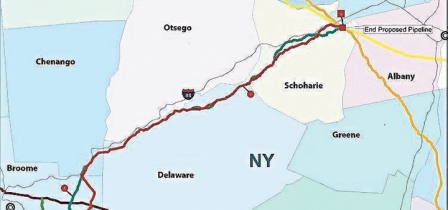Court denies Constitution Pipeline appeal
ALBANY – In another blow to the Constitution Pipeline, a federal court of appeals has backed the New York State DEC’s denial of water quality permits for the controversial natural gas pipeline.
In 2016, Constitution Pipeline, the would-be proprietor of the proposed 124-mile long natural gas pipeline, sued to overturn NYSDEC’s decision.
With that lawsuit denied by the U.S. Court of Appeals for the Second Circuit on Friday, the project is stalled indefinitely.
In a statement issued Friday, the three-judge panel wrote that NYSDEC “is responsible for evaluating the environmental impacts of a proposed pipeline on New York waterbodies in light of the state’s water quality standards.”
The court also said it will “defer to NYSDEC’s expertise as to the significance of the information requested from Constitution, given the record evidence supporting the relevance of that information to NYSDEC’s certification determination.”
The proposed pipeline route originates in Susquehanna County, Penn., and terminates in the Town of Wright in Schoharie County, NY. The line would connect to two existing interstate natural gas pipelines at Wright: Iroquois Gas Transmission (which extends to the NYC area) and the Tennessee Gas Pipeline (which serves parts of New England).
Localities along the route, notably in Delaware and Chenango counties, planned gas distribution which proponents say would lower energy costs for area homeowners and businesses.
Constitution Pipeline says the court’s latest decision is a setback, but not the end of the line.













Comments